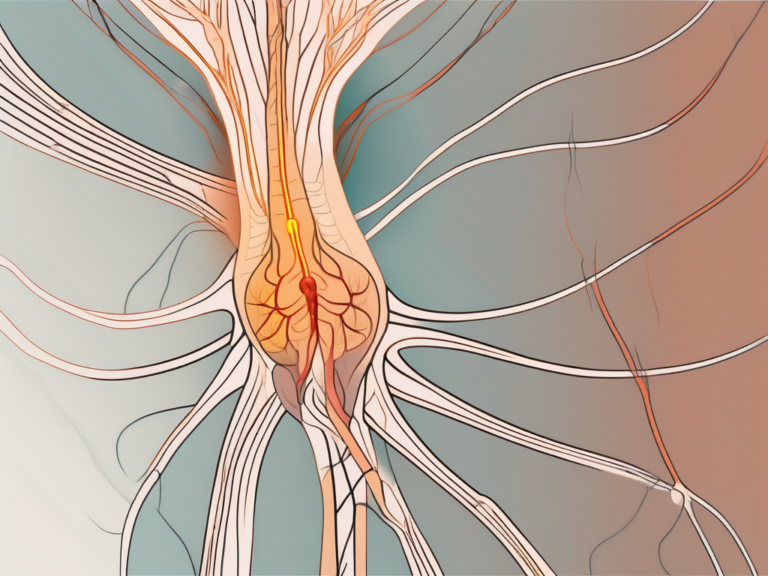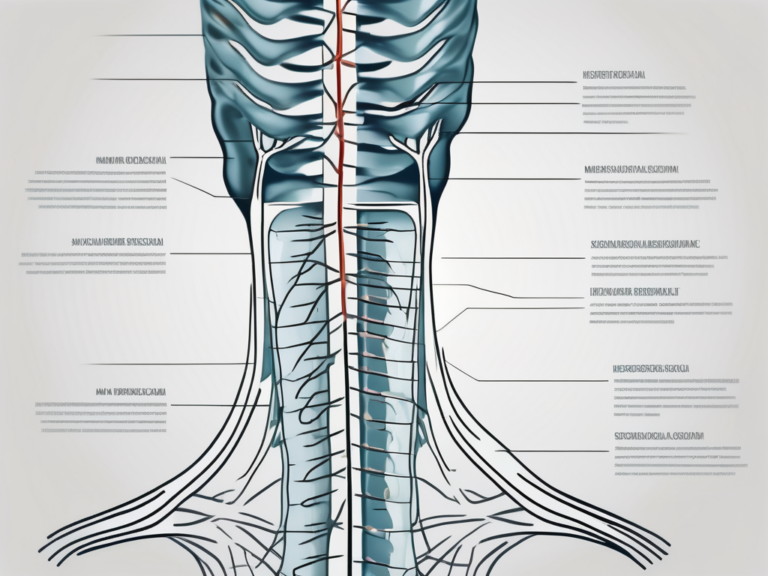How to Reset the Sacral Nerve: A Step-by-Step Guide
The sacral nerve plays a vital role in our overall well-being, but its health and function can sometimes be compromised. If you’ve been experiencing issues with your sacral nerve, learning how to reset it can help restore its optimal function. In this step-by-step guide, we will delve into the various aspects of the sacral nerve, its importance, and the necessary precautions and preparations for a successful reset.
Understanding the Sacral Nerve
The Role and Function of the Sacral Nerve
The sacral nerve, also known as the sacral plexus, is a crucial component of the peripheral nervous system. Located in the lower back, the sacral nerve is responsible for transmitting signals between the brain and various organs and muscles in the pelvic region.
Its primary function is to control and regulate the functions of the reproductive system, bladder, bowel movements, and sexual organs. Additionally, the sacral nerve plays a crucial role in our ability to walk and maintain balance.
The sacral nerve is a complex network of nerve fibers that originate from the spinal cord. These fibers branch out and innervate different parts of the pelvic region, ensuring proper communication between the brain and the organs and muscles in that area.
When it comes to the reproductive system, the sacral nerve plays a vital role in sexual function. It is responsible for transmitting signals that stimulate sexual arousal and pleasure. Dysfunction of the sacral nerve can lead to sexual dysfunction, such as erectile dysfunction or loss of sensation.
In addition to sexual function, the sacral nerve also controls bladder and bowel movements. It sends signals to the bladder muscles, instructing them to contract and release urine. Similarly, it regulates the muscles in the rectum and anus, allowing for proper bowel movements.
Furthermore, the sacral nerve is involved in maintaining balance and coordinating movements in the lower limbs. It works in conjunction with other nerves and muscles to ensure smooth and coordinated walking. Dysfunction of the sacral nerve can lead to difficulties in walking, loss of balance, and even falls.
Common Disorders of the Sacral Nerve
Several disorders can affect the sacral nerve, leading to dysfunction and discomfort. Some common conditions include:
- Sacral nerve compression: This occurs when there is pressure on the sacral nerve, often due to a herniated disc or bone spurs. It can cause pain, numbness, and weakness in the lower back, buttocks, and legs.
- Sacral nerve entrapment: In this condition, the sacral nerve becomes trapped or compressed by surrounding tissues, such as muscles or ligaments. It can result in localized pain, tingling, and muscle weakness.
- Sacral radiculopathy: This refers to the irritation or inflammation of the nerve roots that form the sacral nerve. It can cause radiating pain, numbness, and weakness in the lower back, buttocks, and legs.
- Sacral neuropathy: This is a general term for any damage or dysfunction of the sacral nerve. It can be caused by various factors, including trauma, infection, or certain medical conditions. Symptoms may include pain, numbness, and loss of function in the pelvic region.
If you suspect that you might be experiencing issues with your sacral nerve, it is advisable to consult with a healthcare professional for an accurate diagnosis and personalized treatment plan. They can perform a thorough examination, order diagnostic tests if necessary, and recommend appropriate interventions to alleviate your symptoms and improve your quality of life.
The Importance of Sacral Nerve Health
The Connection Between Sacral Nerve and Overall Wellbeing
When the sacral nerve functions optimally, it contributes to our overall well-being. It helps regulate bodily functions and ensures a healthy reproductive system, normal bowel and bladder movements, and a satisfying sex life. Moreover, a healthy sacral nerve facilitates comfortable mobility and balance.
The sacral nerve, also known as the second sacral nerve, is a crucial component of the autonomic nervous system. It originates from the sacral plexus, a network of nerves located in the lower back. This nerve plays a vital role in transmitting signals between the brain and the pelvic organs, including the bladder, rectum, and reproductive organs.
When the sacral nerve is functioning properly, it sends and receives signals effectively, allowing for smooth coordination of various bodily functions. For example, it helps control the contraction and relaxation of the muscles involved in urination and defecation, ensuring normal bowel and bladder movements.
In addition to its role in bodily functions, the sacral nerve also contributes to sexual health and pleasure. It plays a key role in transmitting sensory information from the genitals to the brain, allowing for sexual arousal and orgasm. A healthy sacral nerve is therefore essential for a satisfying sex life.
Furthermore, the sacral nerve is involved in maintaining balance and mobility. It helps coordinate the muscles in the lower limbs, allowing for smooth movements and preventing falls. When the sacral nerve is functioning optimally, individuals can enjoy comfortable mobility and perform daily activities without difficulty.
Long-Term Impacts of Sacral Nerve Dysfunction
If left untreated, sacral nerve dysfunction can have long-term impacts on one’s quality of life. Chronic pain, urinary incontinence, constipation, sexual dysfunction, and mobility issues are some potential consequences. Recognizing the signs and addressing the problem promptly is crucial for a timely reset and recovery.
Chronic pain is one of the most common symptoms of sacral nerve dysfunction. When the nerve is damaged or compressed, it can result in persistent pain in the lower back, buttocks, and legs. This pain can be debilitating, making it difficult to perform daily activities and negatively impacting overall well-being.
Urinary incontinence is another potential consequence of sacral nerve dysfunction. When the nerve is not functioning properly, it can lead to an inability to control bladder function, resulting in involuntary urine leakage. This can be embarrassing and significantly affect one’s self-esteem and quality of life.
Constipation is also a common issue associated with sacral nerve dysfunction. The nerve plays a role in regulating the muscles involved in bowel movements. When it is compromised, individuals may experience difficulty passing stool, leading to discomfort and potential complications such as hemorrhoids.
Sexual dysfunction can also occur as a result of sacral nerve dysfunction. When the nerve is not functioning optimally, it can lead to decreased sensitivity in the genital area, making it difficult to achieve sexual arousal and orgasm. This can have a significant impact on one’s sexual satisfaction and overall well-being.
Furthermore, sacral nerve dysfunction can affect mobility and balance. When the nerve is damaged or impaired, it can lead to weakness or coordination difficulties in the lower limbs. This can increase the risk of falls and limit one’s ability to engage in physical activities, ultimately affecting overall mobility and independence.
In conclusion, maintaining the health of the sacral nerve is crucial for overall wellbeing. It plays a vital role in regulating bodily functions, ensuring a healthy reproductive system, normal bowel and bladder movements, and a satisfying sex life. Recognizing the signs of sacral nerve dysfunction and seeking timely treatment is essential to prevent long-term impacts on quality of life.
Preparing for Sacral Nerve Reset
Necessary Precautions and Preparations
Before attempting a sacral nerve reset, it is essential to take necessary precautions and prepare adequately. Consulting with a qualified healthcare professional is strongly recommended. They can evaluate your condition, discuss treatment options, and guide you in the proper technique of resetting the sacral nerve.
When preparing for a sacral nerve reset, it is important to gather all relevant medical records and information about your condition. This will help the healthcare professional get a comprehensive understanding of your situation and make informed decisions regarding your treatment.
In addition to consulting with a healthcare professional, it is also advisable to do thorough research on sacral nerve resets. Understanding the procedure, its potential benefits, and possible risks will empower you to make informed decisions about your health.
Understanding the Risks and Benefits
While a sacral nerve reset can offer relief and improve your symptoms, it is crucial to be aware of the risks and benefits associated with the procedure. Each individual’s situation may vary, and a healthcare professional can provide insights specific to your condition and needs.
One of the potential risks of a sacral nerve reset is infection. It is important to ensure that the procedure is performed in a sterile environment by a qualified professional to minimize the risk of infection.
On the other hand, the benefits of a sacral nerve reset can be significant. It can help alleviate chronic pain, improve bladder and bowel control, and enhance overall quality of life. By resetting the sacral nerve, the body’s natural healing mechanisms can be activated, leading to improved function and reduced symptoms.
However, it is important to note that the effectiveness of a sacral nerve reset may vary from person to person. Some individuals may experience immediate relief, while others may require multiple sessions to achieve the desired results. It is crucial to have realistic expectations and maintain open communication with your healthcare professional throughout the process.
Step-by-Step Guide to Resetting the Sacral Nerve
Initial Steps and Safety Measures
Before starting the actual procedure, ensure that you are in a safe and comfortable space, free from distractions. Following these steps can help ensure a successful reset:
Creating the right environment is crucial for a successful sacral nerve reset. Find a quiet and peaceful space where you can fully focus on the procedure. It’s important to eliminate any potential distractions, such as loud noises or interruptions. This will allow you to fully immerse yourself in the process and maximize its effectiveness.
Once you have found your ideal space, make sure you are physically comfortable. Find a flat surface or use a yoga mat to lie down on your back. This position will provide stability and support throughout the reset.
Now that you have set up your space, it’s time to prepare your mind and body. Before beginning the procedure, take a few moments to take deep breaths. Inhale slowly, filling your lungs with fresh air, and exhale deeply, releasing any tension or stress. This will help relax your body and calm your mind, creating an optimal state for the sacral nerve reset.
With your body relaxed and your mind at ease, gently position your hands on your lower abdomen, near the pelvic region. This will allow you to connect with the area that houses the sacral nerve, establishing a physical connection that will enhance the effectiveness of the reset.
Now that you are fully prepared, it’s time to move on to the next steps of the sacral nerve reset.
- Begin by lying down on your back, preferably on a flat surface or yoga mat.
- Take a few deep breaths to relax your body and calm your mind.
- Gently position your hands on your lower abdomen, near the pelvic region.
- Using slow, controlled movements, massage the area surrounding the sacral bone.
Detailed Procedure for Sacral Nerve Reset
Once you have prepared yourself, follow these steps to reset your sacral nerve:
Now that you have set the foundation for the sacral nerve reset, it’s time to dive into the detailed procedure. These steps will guide you through the process, ensuring that you perform the reset correctly and effectively.
- Lie down on your back with your knees bent and feet flat on the ground.
- Take a few deep breaths, focusing on inhaling and exhaling slowly.
- As you exhale, gently press your sacrum against the floor or mat.
- Hold this position for a few seconds, then release and relax.
- Repeat this movement several times, ensuring you maintain a gentle and controlled pressure.
Remember to listen to your body throughout the procedure and start with a comfortable level of pressure. The sacral nerve reset should not cause any pain or discomfort. If you experience any discomfort, stop immediately and consult with a healthcare professional.
By following these steps and taking the necessary precautions, you can effectively reset your sacral nerve and promote overall well-being. Remember to approach the procedure with patience and mindfulness, allowing yourself to fully connect with your body and its natural healing abilities.
Post-Reset Care and Maintenance
What to Expect After a Sacral Nerve Reset
After resetting your sacral nerve, it is normal to experience some temporary sensations, such as subtle warmth or relaxation. However, the specific outcomes may vary depending on your individual circumstances. It is advisable to rest and allow your body time to adjust.
When it comes to the post-reset care and maintenance of your sacral nerve, there are several factors to consider. It’s important to understand that the sacral nerve plays a crucial role in various bodily functions, including bladder and bowel control, sexual function, and lower limb mobility. Therefore, taking care of this nerve is essential for overall well-being.
While the immediate effects of a sacral nerve reset may be noticeable, it is crucial to continue practicing good habits to maintain the health of your sacral nerve in the long run. By incorporating the following practices into your routine, you can promote the optimal functioning of your sacral nerve:
Tips for Maintaining Sacral Nerve Health
1. Engage in regular physical activity: Regular exercise helps strengthen the muscles supporting the sacral nerve. Activities such as walking, swimming, or yoga can be beneficial in maintaining the health of your sacral nerve. It is important to consult with a healthcare professional to determine the appropriate level of physical activity for your specific condition.
2. Practice stress management techniques: Chronic stress can have a negative impact on nerve health. Incorporating stress management techniques into your daily routine, such as meditation, deep breathing exercises, or engaging in hobbies that bring you joy, can help reduce stress levels and promote the well-being of your sacral nerve.
3. Ensure a balanced diet: Proper nutrition is vital for nerve health. Including foods rich in essential nutrients, such as vitamins B12, B6, and E, as well as omega-3 fatty acids, can support the health of your sacral nerve. Consult with a registered dietitian or healthcare professional to create a personalized diet plan that meets your specific nutritional needs.
4. Stay hydrated: Drinking an adequate amount of water is essential for optimal nerve function. Dehydration can affect the transmission of nerve signals, so it is important to stay hydrated throughout the day. Aim to drink at least eight glasses of water daily, or more if you engage in intense physical activity or live in a hot climate.
5. Listen to your body: Pay attention to any changes or symptoms you may experience after a sacral nerve reset. While some temporary sensations are normal, persistent or worsening symptoms should not be ignored. If you notice any unusual or concerning symptoms, it is important to seek medical attention promptly. A healthcare professional can evaluate your condition and provide appropriate guidance.
By following these tips and incorporating them into your daily routine, you can take an active role in maintaining the health of your sacral nerve. Remember, each person’s journey is unique, so it is important to consult with a healthcare professional for personalized advice and guidance based on your specific needs.
Frequently Asked Questions About Sacral Nerve Reset
Addressing Common Concerns and Misconceptions
There are several common concerns and misconceptions surrounding sacral nerve reset. Here are answers to some frequently asked questions:
- Is sacral nerve reset suitable for everyone?
- Can sacral nerve reset cure all sacral nerve disorders?
Sacral nerve reset may not be suitable for everyone, especially those with underlying medical conditions. It is essential to consult with a healthcare professional to determine if it is appropriate for you.
Sacral nerve reset can help relieve symptoms and promote nerve health, but it may not cure all underlying disorders. Again, individual circumstances may vary, and consulting with a healthcare professional is crucial for accurate diagnosis and treatment.
Expert Answers to Your Sacral Nerve Questions
If you have additional questions or concerns about the sacral nerve or resetting procedures, it is recommended to consult with a qualified healthcare professional or specialist. They can provide personalized advice based on their expertise and your specific needs.
Remember, the information provided in this article is informative and should not substitute professional medical advice. Always seek guidance from a healthcare professional before attempting any procedures or treatments related to your health and well-being.





